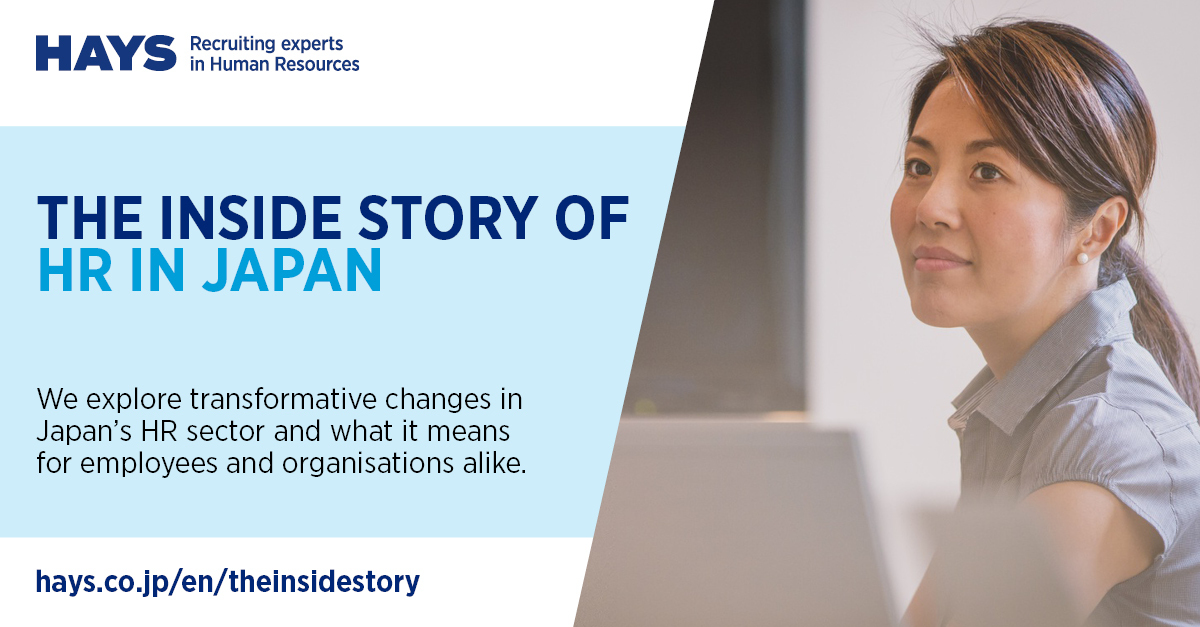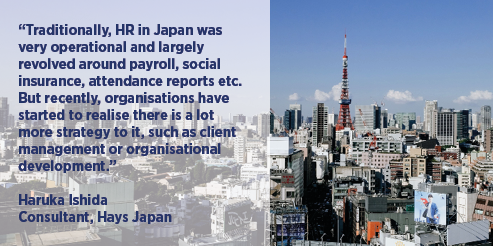The Inside Story of Human Resources in Japan (2019)

The ever-complex labour market in Japan has seen a significant number of challenges in recent times, such as a rapidly ageing population that has contributed to a chronic and crippling shortage of labour; or the only marginal raise in wages observed despite this. But on the bright side, Japan’s unemployment rate has remained at an all-time low, although it recently saw a spike which also harkens good news as more jobseekers enter the market. One of the most positive developments however, has been the implementation of a new labour law that aims to transform Japan’s notorious culture of ‘overworking’. The result of this has been a rise in hiring activity for strategic, senior HR professionals and the increasing use of Human Resource Information Systems (HRIS), underlined by a consistent demand for recruiters and talent acquisition skills.
Labour market overview: A period of positive change and digital development
Japan’s new "Work Style Reform Legislation" was passed in 2018 and made significant revisions to Japan's labour laws, including an explicit capping of overtime hours, mandated utilisation of annual leave, and arrangements to monitor employee health, among others. Most of the amendments took effect in April this year, pushing employers to take immediate action and comply with the new requirements, subsequently driving hiring in the HR market.
“Companies have taken work-life balance a lot more seriously after this,” shares Haruka Ishida, Consultant for Hays Japan. “Many organisations have been implementing flex time and work from home systems this year, as well as better maternity, paternity and child care leave plans. More candidates are also using these as a measure to evaluate potential employers.” This has led to an increased demand for strategic HR Business Partners (HRBP) who can help drive institutional change from the top, and guide companies through this period of transition.
The focus on curbing overtime and encouraging employee health has put the spotlight on HRIS and digital capabilities, as more companies in Japan move towards paperless methods of managing data like employee timesheets. Those using excel or basic HR software like workday will are likely to start upgrading their systems, while ‘early adopters’ like large IT companies have already started using their HRIS to analyse overtime, headcount and talent management. “This is helping HR employees take data to the next level and come up with strategic solutions to employee problems,” says Haruka.
But despite the influx of new skills and jobs, the market remains distinctly talent short, putting qualified candidates at an advantage when it comes to compensation. As Haruka explains, “Traditionally, Japanese companies don’t like giving huge increases to new hires as they do not want to encourage them to jump companies. But something I always tell organisations is that it no longer matters what a candidate used to or currently earns – it is about matching the market standard and not pushing them into the arms of a willing competitor instead.”
“Something I always tell organisations is that it no longer matters what a candidate used to or currently earns – it is about matching the market standard and not pushing them into the arms of a willing competitor instead”
- Haruka Ishida, Consultant, Hays Japan.

Skills in demand: Direct sourcing, bilingual proficiency, strategic experience and IT skills
Owing to the ongoing severe shortage in talent, recruiter and talent acquisition specialist roles have flooded the market and become a staple junior-mid level hiring need for most organisations, including MNCs. As Haruka shares, “Almost every company is looking for recruiter, particularly within start-ups or large IT companies, because the Japan market is so different from any other countries in Asia Pacific (APAC). This makes it difficult for a lot of regional recruiters to remotely manage headcount in Japan, so companies would rather hire a local Japanese recruiter with direct sourcing skills instead.” Direct sourcing is a recruiter-specific skill and is often the reason why companies turn to recruitment agencies instead. Apart from this, Bilingual proficiency is highly sought after, as the recruiter is likely to communicate frequently with global or regional offices. Career consultant licenses have also become more commonplace.
For senior roles, HRBP are the most in demand, owing partly to changing mindsets in Japan as Haruka shares, “Traditionally, HR in Japan was very operational and largely revolves around payroll, social insurance, attendance reports etc. But recently, organisations have started to realise there is a lot more strategy to it, such as client management or organisational development.” HRBPs are also critical to encouraging retainment in a company, as a number of candidates leave companies when they see no clear career path for them. “Being a job hopper used to be a bad thing as people usually stayed in the same company for 10-20 years. But recently, companies are becoming more flexible with candidates who change jobs after 3-6 years. A lot of young talents are thus not hesitant to leave if they feel they are not being evaluated correctly or don’t see a career plan. A strong HRBP is very important and even necessary in such cases to ensure the HR team has strong relationships with all parts of the business – from sales to engineers.”
But a HRBP role is amongst the hardest to source for, considering it is relatively new to the market and often requires candidates to have an MBA as well as several years of strategic HR planning experience in areas such as talent management, stakeholder management etc. Apart from this, the talent shortage has a number of companies competing for similar type of candidates – particularly bilingual ones. Many companies are also seeking to balance out their ageing workforce by hiring younger talent – resulting in a paradox as younger candidates often do not have the experience required for HRBP roles. While some companies are willing to settle for younger candidates with 3-5 years of HR generalist experience, the absence of flexibility is unlikely to be sustainable, Haruka warns.
As Japan continues to go paperless, IT skills have also become increasingly in demand within HR. This is particularly applicable for payroll or HR admin candidates who are expected to be familiar with software like Workday, Peoplesoft and Taleo.
“Traditionally, HR in Japan was very operational and largely revolves around payroll, social insurance, attendance reports etc. But recently, organisations have started to realise there is a lot more strategy to it, such as client management or organisational development.”
- Haruka Ishida, Consultant, Hays Japan.

Organisations ramp up branding efforts and benefits
Considering the fierce competition in Japan’s job market today, it comes as no surprise that organisations have been ramping up their efforts to increase employer branding and attract more candidates. New roles such as ‘recruiting branding specialists’ have begun appearing in the market, along with hiring in the digital marketing/employer branding space. “This year, we even began seeing job advertisements on Instagram. We are likely to see much more of this in the years to come as more organisations invest in their digital marketing to attract candidates,” says Haruka.
Organisations have also increased their budgets for events and internships and are becoming significantly more generous with their benefits. One of the Big 4 consulting firms recently implemented ‘refresh’ leaves or an additional type of annual leave that can be used during any big life events or changes. A lot of companies have also implemented ‘care’ leaves, which employees can use to take care of ageing parents. Signing bonuses have also become increasingly common, particularly within companies that are bound by ‘bands’ or levels of remuneration. “Sign-on bonuses are something a lot of companies use these days because they are competing for such a small talent pool. If they can’t match the compensation of competitors – they can offer signing bonuses of up to 2 million,” Haruka reveals. Organisations are also becoming more flexible with revealing their average overtime, benefit plans and other data at interview stages.
Considering the recent development in labour laws and the ongoing shortage of talent, the future is promising for strategic HR candidates, “especially when it comes to bilingual candidates – there are so many new positions and responsibilities in HR that most companies never imagined having until a few years ago,” says Haruka. However, organisations are advised to stay realistic in their expectations and critically evaluate the appeal and utility of younger candidates before it is too late into the process.
If you would like to discuss this report in more depth or you wish to discuss your job search or recruitment needs, please email hays.hr@hays.co.jp.
Reports
Whitepapers
The Future of Work: How AI is impacting your workforce
2024/2025 Hays Asia DE&I report
The Workforce of the Future Report
2024 Japan’s Technology Talent Trends
2024 Japan Accountancy and Finance Talent Trends
Future of Asia’s Technology Industry
Diversity, Equity & Inclusion Report
DNA series
